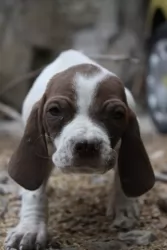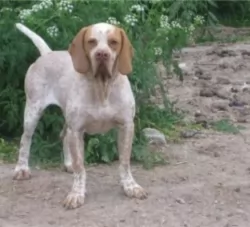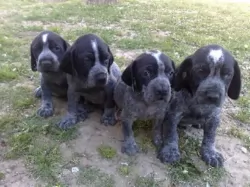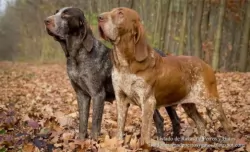 MyDogBreeds
MyDogBreeds Pachon Navarro is originated from Spain but Hokkaido is originated from Japan. Pachon Navarro may grow 6 cm / 3 inches higher than Hokkaido. Pachon Navarro may weigh 16 kg / 35 pounds lesser than Hokkaido. Both Pachon Navarro and Hokkaido has same life span. Both Pachon Navarro and Hokkaido has almost same litter size. Pachon Navarro requires Low maintenance. But Hokkaido requires Moderate maintenance
Pachon Navarro is originated from Spain but Hokkaido is originated from Japan. Pachon Navarro may grow 6 cm / 3 inches higher than Hokkaido. Pachon Navarro may weigh 16 kg / 35 pounds lesser than Hokkaido. Both Pachon Navarro and Hokkaido has same life span. Both Pachon Navarro and Hokkaido has almost same litter size. Pachon Navarro requires Low maintenance. But Hokkaido requires Moderate maintenance
 Known also as the Navarra Pointer, this is a Spanish hunting dog native to Navarre, Spain and descended from the extinct Old Spanish Pointer.
Known also as the Navarra Pointer, this is a Spanish hunting dog native to Navarre, Spain and descended from the extinct Old Spanish Pointer.
Major kennel clubs don’t recognize this dog as a standardized breed, but the Spanish Kennel Club has accepted the Pachón Navarro as a breed.
It is believed that this dog has also descended from other hounds as well as the Talbot hounds. It isn’t a new breed as it is thought that the dog originated in the 12th century already. There were times when the dog almost became extinct but efforts to preserve it have been made and to also establish it as a standardized breed.
 The Hokkaido breed originates in Japan and is also called Ainu-ken, Ainu dog, Seta or Do-ken. The last being its common name in Japan. It is believed that the Hokkaido is descendent from the Japanese Matagi-ken, meaning hunting dog, deer hunting dog or bear hunting dog. It was the Ainu peoples that brought the breed to Tohoku. Many years later the Yayoi people brought in another breed of hunting dogs. These breeds were in isolation for most of their existence and therefore they had little influence on the further development of other breeds.
The Hokkaido breed originates in Japan and is also called Ainu-ken, Ainu dog, Seta or Do-ken. The last being its common name in Japan. It is believed that the Hokkaido is descendent from the Japanese Matagi-ken, meaning hunting dog, deer hunting dog or bear hunting dog. It was the Ainu peoples that brought the breed to Tohoku. Many years later the Yayoi people brought in another breed of hunting dogs. These breeds were in isolation for most of their existence and therefore they had little influence on the further development of other breeds.
The Ainu dog was used in searches as well as hunting and became in 1937 “a rare species in Japan that is protected by law”. At that time the Official Name of the breed was set in place as Hokkaido-Inu. But they are still called Hokkaid0-Ken by most Japanese people.
This is a very rare breed of dog. It is hardly known outside of Japan and in country there are about ten to twelve thousand remaining. Of those about nine hundred to one thousand are registered in Japan every year. It is guessed that less than thirty exist outside Japan.
The Hokkaido breed is the oldest Japanese breed of dogs. Today they are great indoor companions, loyal and friendly. Most people in Japan still call them the Ainu dog.
 This dog is large sized, standing at between 48 and 57cm in height and weighing between 27 and 33kg. A most unusual feature and characteristic unseen in dogs in general is his split or double nose. The nose of the dog serves the same purpose however, as with any other dog.
This dog is large sized, standing at between 48 and 57cm in height and weighing between 27 and 33kg. A most unusual feature and characteristic unseen in dogs in general is his split or double nose. The nose of the dog serves the same purpose however, as with any other dog.
The head is fairly large with a broad forehead. The broad head of the dog is generally solid colored. The coat of the coat of the dog is short and of a hard texture. Colors of the coat are white and brown or white and black or white and an orangey color with ticking.
The eyes are large and brown, the ears are long and broad with a rounded tip and the tail is long too. These dogs have a strong, sturdy body with strong legs.
The Pachon Navarro is a friendly, social, intelligent, loving and loyal dog. He is also gentle and docile with an amicable nature, making him a splendid choice for those with children in the home as well as pets.
He is athletic and energetic and is going to need a good dose of daily exercise. Apart from their strong hunting instincts, they make excellent family pets and companions and is most certainly not a dog to be put outdoors day after day without the contact of his human family.
He is intelligent and a quick learner and will benefit from training and socialization as this makes him obedient and it also bring about positive changes with any bad behavior from this excellent pet.
He requires a kind, firm, patient and consistent owner. This particular dog won’t be suited to living in a tiny property in the city, as they require a lot of space to run and exercise.
 The Hokkaido breed is medium in size but very strong in build. Dogs bred outside Japan tend to be smaller. They have wide, deep chests, and long thick coats compared with Japanese dogs from other breeds. It is a double coat of long fur on top and short softer fur underneath for the second coat. Their ears are triangular and small while their eyes have a triangle outline. The double coat could be sesame, white, red, black, black and tan and wolf-gray.
The Hokkaido breed is medium in size but very strong in build. Dogs bred outside Japan tend to be smaller. They have wide, deep chests, and long thick coats compared with Japanese dogs from other breeds. It is a double coat of long fur on top and short softer fur underneath for the second coat. Their ears are triangular and small while their eyes have a triangle outline. The double coat could be sesame, white, red, black, black and tan and wolf-gray.
They are an intelligent breed with an impulsive gait. They are alert, courageous and suspicious. They were used for guarding the city gates. Their skull is flat and broad and the tongue, like the chow chow, is blueish. black. With a black nose and a wedge shaped muzzle, the Hokkaido is a handsome dog. His lips are with black and tight. High set, thick tail over the back or slightly curved to the side.
 The Pachón Navarro is an active, friendly, playful, affectionate dog and he makes a great family pet. He will however want lots of outdoor exercise, making him a suitable companion for active owners. Inactive city dwellers should think of keeping a more docile kind of indoor pet.
The Pachón Navarro is an active, friendly, playful, affectionate dog and he makes a great family pet. He will however want lots of outdoor exercise, making him a suitable companion for active owners. Inactive city dwellers should think of keeping a more docile kind of indoor pet.
Your Pachón Navarro just loves the company of his human family and will be dejected if made to spend all his time outside and away from his owner.
He also takes his role as guardian and protector seriously. Give him what he requires and make him part of the family and he will be a most remarkable friend and companion.
 Pachon Navarros are generally healthy dogs and you’re not likely to spend much time at the vets with these dogs. They can reach up to 15 years of age if looked after well, but with the long ears they are prone to ear infections.
Pachon Navarros are generally healthy dogs and you’re not likely to spend much time at the vets with these dogs. They can reach up to 15 years of age if looked after well, but with the long ears they are prone to ear infections.
Moisture, wax and dirt can all build up inside the dog's ears and this can cause a painful ear infection with the dog scratching and pawing at his ear.
Bloat is another illness to look out for and you'll notice your dog is lethargic and has a swollen, hard stomach with gas being trapped inside. The condition is life threatening and will require a trip to the vet.
 Often breeds that are isolated like the Hokkaido, have a pretty good health history but there are a few serious issues that they face.
Often breeds that are isolated like the Hokkaido, have a pretty good health history but there are a few serious issues that they face.
1/3 of all dogs have it while 2/3 are carriers. This disease is congenital and there is no cure. It affects the sclera, retina and choroid. It can be mild or it can cause blindness.
Affecting joints and cause arthritis and lameness.
Floating kneecap – not as prevalent here as in smaller dogs.
Could be mild or serious. Could require a pacemaker.
Seizures of an unknown origin. Can be treated with medication not cured.
Excessive, uncontrollable urge to drink large amounts of fluid without a stimuli.
 Your Pachon Navarros is a low maintenance dog and you will just be required to give him a good brush. He is a moderate shedder and this brushing down will keep the skin and coat healthy.
Your Pachon Navarros is a low maintenance dog and you will just be required to give him a good brush. He is a moderate shedder and this brushing down will keep the skin and coat healthy.
Because of his long, floppy ears, you will need to check inside them because moisture, dirt and wax can build up and encourage an ear infection. Don’t try to clean inside your pet’s ears if you’re not sure how, rather find out about cleaning the ears from the vet.
The nails will also need to be clipped as well as checking regularly on the eyes and teeth.
Your Pachon Navarro is a hardworking dog and you want to ensure tasty, palatable food that is properly digested and eliminated without problems. If you feed your dog a commercially manufactured dog food, choose the best quality and check out the labels.
Make sure that the food doesn’t contain lots of preservatives, colorants and fillers. Some of the best kibble has the right balance of vitamins and minerals in them. With these kind of hunting dogs, it is best to feed your dog hours before vigorous exercise such as a hunt.
Try and vary the regular kibble by adding in simple, but tasty home-made food occasionally. Dogs appreciate simple food without spices and exotic ingredients as its keeps their stomachs free from pain, gas and bloat.
Some chopped up boiled chicken, some brown rice or pasta and some vegetables such as sweet potato, carrots and spinach is super healthy for your pet as well as adding in a little bit of raw meat from time to time.
Remember clean, fresh water must be constantly available.
 The puppy needs about 300 -400 calories per day in 3-4 servings per day
The puppy needs about 300 -400 calories per day in 3-4 servings per day
The adult dog needs about 250-350 calories a day to maintain good weight and health. Feed 2-3 times per day.
Strong, stamina
These dogs love exercise and definitely need it. They will get to be anxious or bored if they don’t get enough exercise. A back yard run is fine but remember that the Hokkaido is a jumper and make sure your fence is at least six feet high. They need daily walks even if you have a fenced yard. Martindale collars or harnesses are needed when walking them.
These dogs love games and competitive activities. They are good at hunting and guarding of course. There are other activities they can excel at and enjoy jogging, biking with you, and hiking. In competition they enjoy and are good at agility, flyball, lure coursing, rally, weight pull, dock diving, and obedience. They do not participate in confirmation.